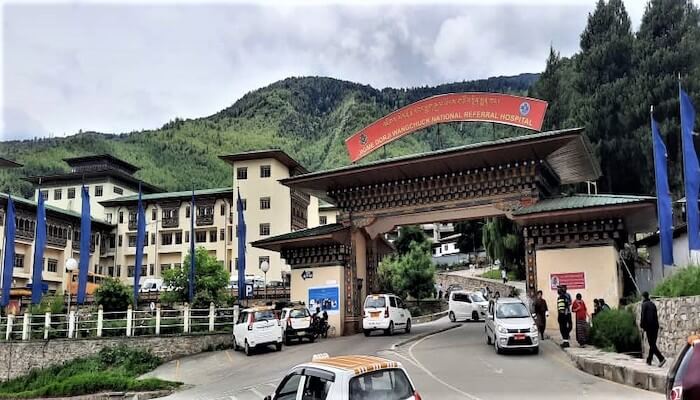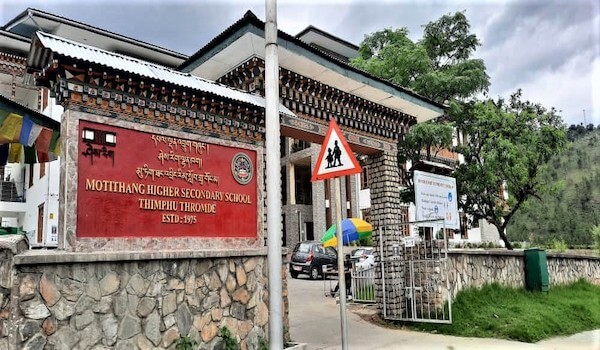 Health
Health
The Ministry of Health (MOH), Royal Government of Bhutan aims to achieve universal health coverage by improving access to quality and equitable health services, strengthening preventive, promotive, curative, rehabilitative and palliative health services, and promoting efficiency and effectiveness in the financing and delivery of health services. Its vision is ‘A nation with the best health’. Basic public healthcare is free, as reflected in the Constitution of Bhutan: The State shall provide free access to basic public health services in both modern and traditional medicines. Healthcare is delivered to the citizens of Bhutan through 32 hospitals & 205 basic health units and there are no private medical practitioners & private hospitals.
As of now, there are 345 Doctors and 2,364 nurses & Health Assistants in the country. The best health facility in Bhutan is at Jigme Dorji Wangchuk National Referral Hospital (JDWNRH) in Thimphu, where patients including even tourists can receive free basic medical treatment as well as advanced services such as surgical and emergency treatment. But treatment for serious and critical illnesses not available in Bhutan such as cancer and neurosurgery and patients need to be transported to India or Thailand for advanced medical facilities. Also, outside of the major urban centres, it is difficult to find medical care beyond basic health services. With the continuous improvements and priority accorded to the health care system, life expectancy in Bhutan has reached 70.2 years from 66.3 years in 2005. Also, a significant achievement is the status of the Health Trust Fund. The fund has doubled from Nu 1.2 billion to Nu 2.3 billion and this increase ensures that current and future generations continue to receive free medicine.
Importantly, the healthcare system in Bhutan comprises modern and traditional medical systems, which are integrated to maximize public healthcare services. The 'Sowa Rigpa' system was formally introduced into the national healthcare system in 1967 under the command of the Third King Jigme Dorji Wangchuck. This was initiated with the vision of not only looking after the medical welfare of people but also preserving and further promoting the traditional medical system in the country. Starting from a single indigenous dispensary in 1967 in the capital city Thimphu, the traditional medical service in Bhutan has grown rapidly over the years to cover the entire country. In 1979, the indigenous dispensary was upgraded to the National Indigenous Hospital and in 1998 to the Institute of Traditional Medicine Services (ITMS) with respect to the increased interest in Sowa Rigpa. By the end of 2001, traditional medicine units (providing Sowa Rigpa) were attached to district hospitals and had been established in all 20 districts of Bhutan. Thus, the collaboration between modern and traditional medicine and cross-referrals of patients was facilitated. The availability of rich biodiversity coupled with the great importance Bhutanese communities paid to live in harmony with nature ensured the survival of Sowa Rigpa. It is a combination of science, philosophy and religion that blends culture & tradition and epitomizes the holistic healthcare approach in which health and spirituality are inseparable.
Education
Education is recognized both as a basic right and as a pre-requisite for achieving the wider social, cultural and economic goals set for the country within the national vision.
 Education in Bhutan includes monastic and modern education, and both receive equal priority. Until the 1950s, the only education available in Bhutan was from monasteries. While still, monastic education continues to play an important role but western-style education has expanded andis now available throughout the country. Access to basic education has become the inalienable right of all Bhutanese and it is the key to the most of nation’s ambitions. The education policy of the Royal Government of Bhutan is to offer a minimum of 9 years, of free quality basic education to all citizens.
Education in Bhutan includes monastic and modern education, and both receive equal priority. Until the 1950s, the only education available in Bhutan was from monasteries. While still, monastic education continues to play an important role but western-style education has expanded andis now available throughout the country. Access to basic education has become the inalienable right of all Bhutanese and it is the key to the most of nation’s ambitions. The education policy of the Royal Government of Bhutan is to offer a minimum of 9 years, of free quality basic education to all citizens.
Gongsar Ugyen Wangchuck, the first King of Bhutan unfurled the modern education system when forty-six boys were sent to India for Western education in 1914. The earlier education system in Bhutan had colonial relics from India which was geared towards administrative purposes and gaining access to the world. The first batch of students from 1914 succeeded in those policies but studied in Hindi medium schools. Later, the medium of instruction was changed from Hindi to English in 1961. Also, many Indian teachers came to Bhutan to teach Bhutanese students. Simultaneously, many students were also sent to the premier Anglo-Indian education institution in India, in 1961 and those students played a very important role in shaping modern Bhutan.
In earlier days, the shortage of skilled manpower in almost all disciplines used to be a serious problem for Bhutan and to overcome this challenge, The Technical School at Kharbandi known as the Royal Technical Institute was established in 1965 during the early stages of economic development in the country, in pursuant to the need for technical and skilled personnel to implement various development projects. Bhutan also opened the Polytechnic Institute in Dewothang in 1972, which assisted in the production of more competent technical people in the country. Also, emphasis was given to vocational education for the job market and skill development. Besides literacy and technical skills, professional knowledge through higher learning was necessary therefore students were sent overseas for professional courses. Sherubtse College was the first accredited college in Bhutan, founded in 1966 and as of 2003, it became part of the newly created Royal University of Bhutan system that comprises all public post-secondary schools in Bhutan.
Education forms the foundation for modern Bhutanese life and wholesome education provides a holistic approach through critical educational thinking and innovative approaches to develop the mind and body which includes all aspects of human existence and not only academics.
Over the last decade, Bhutan has made significant progress in expanding access to education. The Royal Government of Bhutan has been giving high priority to improving the quality of learning in primary schools and expanding access to secondary education. The 10-year ‘Bhutan Education Blueprint (BEBP 2014-2024)’ focuses on transforming the education system to increase access, quality, equity, and efficiency. The Government recognizes education as a basic right and a prerequisite for achieving the country’s social, cultural, and economic goals.